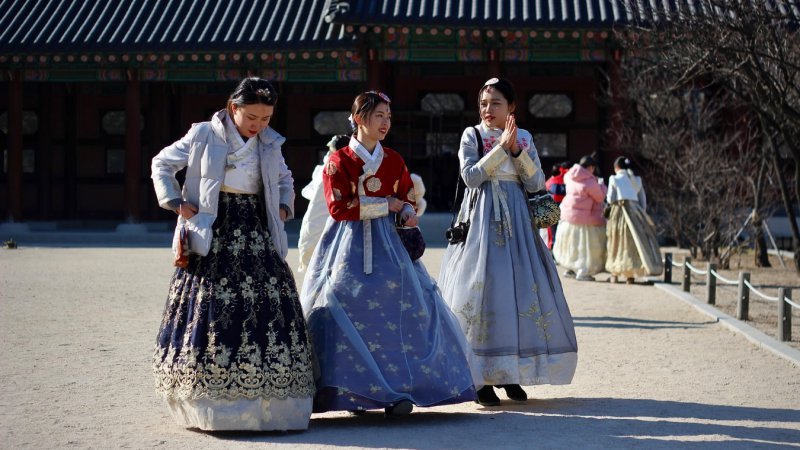Jeong is a Korean word that encompasses feelings of affection, empathy, and loyalty. It's a concept that permeates Korean culture, creating deep emotional bonds between people. In this article, we'll explore the origin, meaning, and cultural influence of this word.
In addition, we will see how Jeong is portrayed in various cultural references. Follow this exciting journey and discover the richness behind this unique and powerful word.
The word Jeong is spelled [정] and is often present in several words that encompass its concept and meaning. So it's not a specific word, but a crucial component of Korean words, perhaps the most important word in the language.
We also recommend reading:
- The 11 Best Manhwas Worthy of Korean Anime
- Finance in Korean: Essential Vocabulary for Investing in the Korean Market
- Saranghae - Several ways to say love in Korean
Índice de Conteúdo
Meaning of Jeong
The meaning of Jeong is complex and wide-ranging, which makes it difficult to accurately define in other languages. The word does not have a direct translation, but it can be understood as a mixture of emotions and feelings that involve love, empathy, affection, loyalty and emotional bond. Jeong is a concept intrinsically related to human relationships and the way people connect emotionally with each other.
Jeong can be experienced on different levels and contexts, from family and love relationships to friendships and community connections. The concept encompasses a wide range of feelings, which can include affection, care, compassion, devotion, and even self-sacrifice for the benefit of others.
At the core of Jeong's concept is the idea of deep emotional connection between people, regardless of blood ties or any other formal connection. Jeong is a force that unites people and emphasizes the importance of caring for and protecting those around us, valuing the emotional bonds created over time and cultivating mutual understanding, respect and devotion.
Read also: How do Koreans find their perfect match? relationship in korea

Jeong's Origin
Jeong's origin is somewhat mysterious, and there is no clear consensus on when and how he emerged in Korean culture. However, it is possible to trace the essence of the concept back to the Three Kingdoms period (57 BC – 668 AD), a time when Korea was divided into three distinct kingdoms: Goguryeo, Baekje and Silla.
During this period, Korea underwent many political and social changes, and the idea of emotional ties between people began to develop. Ancient Koreans valued loyalty, respect, and mutual commitment, aspects that are closely related to the Jeong concept.
While it is not possible to determine the exact origin of Jeong, it is evident that the concept has deep roots in Korean culture and history. It has evolved and adapted over time, remaining an essential element for understanding emotions and relationships in Korean society.

Jeong's cultural influence
Jeong's cultural influence is vast and can be seen in many aspects of Korean society. Here are some examples of how it manifests itself culturally:
- Family relationships: Family is considered the core of Korean society, and Jeong is the force that holds these bonds together. The concept emphasizes the importance of caring for family members and maintaining a close and affectionate relationship with each other. Jeong helps strengthen family ties and create an environment of support and unconditional love.
- Friendships and Interpersonal Relationships: Jeong also plays a significant role in friendships and other interpersonal relationships in Korea. Loyalty, empathy and mutual commitment are essential aspects of the concept, and this is reflected in the way Koreans cultivate and value their friendships. Jeong can be developed and strengthened over time as people share experiences and support each other.
- Traditions and hospitality: Hospitality is an important expression of Jeong in Korean culture. The way Koreans welcome their guests and friends, offering food, drink and a place to rest, is a manifestation of the affection and emotional connection that Jeong provides. This hospitality also extends to cultural traditions such as festivals and celebrations, where communities come together to share joy, affection and mutual support.
- Arts and entertainment: Jeong is also present in Korean art and entertainment such as music, movies and TV series (Korean dramas). These works often explore themes of love, friendship, sacrifice and loyalty, reflecting Jeong's concept and his influence on human relationships and emotions.
- Idiomatic expressions: There are several idioms in Korean that incorporate the concept, demonstrating the importance of this term in everyday life. For example, "Jeongseongeul Dahada" means "putting Jeong into something," which implies devoting time, energy and care to something or someone.
In summary, Jeong's cultural influence is deep and far-reaching, permeating all aspects of Korean society and shaping the way people relate and interact with one another.

The article is still halfway through, but we recommend also reading:
Jeong in Korean POP Culture
The expression “Jeong” is often found in Korean pop media such as dramas and songs. It is used to describe and explore emotional relationships and deep connections between characters and individuals. Here are some examples of dramas and songs that portray Jeong's concept:
- Dorama: “Reply 1988” (응답하라 1988) – This popular Korean TV series explores the relationships between neighbors and friends living in the same neighborhood in 1988. The drama addresses the concept of Jeong through the friendships and emotional connections between the main characters and the community around it.
- Drama: “Hospital Playlist” (슬기로운 의사생활) – This medical series follows the lives of five doctors who work together at a hospital and have been friends since college. The Jeong among the characters is portrayed through their mutual support, empathy, and enduring bonds.
- Song: “Spring Day” (봄날) – BTS – This popular song by K-pop group BTS talks about longing and friendship, and Jeong's concept can be felt in the lyrics and melody. The song conveys the importance of emotional bonds and mutual support between friends, even when they are apart.
- Song: “Through the Night” (밤편지) – IU – IU's song is a soft ballad that expresses affection and love for someone far away. The song's lyrics and melody reflect Jeong's concept, showing the deep emotional connection between two people even when they are apart.
- Drama: “It's Okay to Not Be Okay” (사이코지만 괜찮아) – This drama explores the relationship between a children's book writer and a caretaker at a psychiatric institution. The story goes deep into developing the emotional connection between the characters and touches on Jeong's importance in helping others overcome trauma and find healing.
Korean Words with Jeong
As mentioned at the beginning of the article, many Korean words have jeong [정] in their spelling, see a list of words below:
- 우정 (UJEON) - Friendship
- 호감 (hogamjeong) - attraction, affection
- 은혜 (EUNKYEJEON) - Gratitude, favor, benevolence
- 사정 (sajeong) - circumstance, situation
- 열정 (Yeol -Jeong) - Passion, enthusiasm
- 정서 (Jeongseo) - Feeling, Emotion
- 정감 (Jeonggam) - Sympathy, affinity
- 정의 (Jehongui) - Justice, equity
- 정직 (Jeongjik) - Honesty, Integrity
- 정상 (Jeongsang) - Normal, standard, summit (of a mountain)







